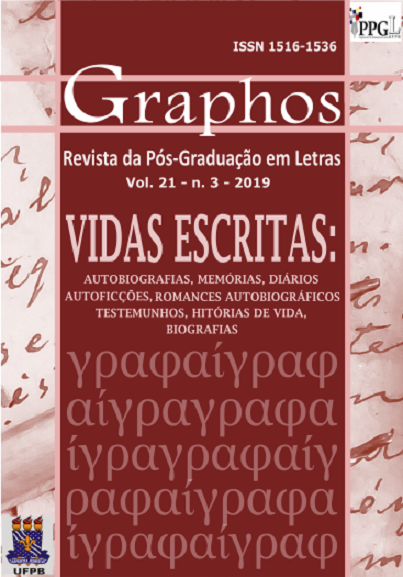The autobiographical narrative and the memory of civil-military dictatorship: a comparative analysis between Brazil and Argentina
Keywords:
Memory, Military Dictatorships, Autobiographical narratives, Brazil, ArgentinaAbstract
Among the events that contributed to the characterization of the twentieth century as the "age of catastrophe", or “age of extremes", civil-military dictatorships established in the second half of the century in the Latin American continent can be considered as phenomena that reinforce this idea. The individual and collective experiences shaped by this historical context have provided considerable material for the production of literary works marked by the testimonial tonic, characteristic of autobiographical narratives. Based on this panorama, the present paper aims to carry out a comparative analysis between two autobiographical narratives that are inserted in a wider scope of works whose central motive is the rescue of the past during the years of military dictatorship in Brazil and Argentina. Presenting the memory – considered at the individual and the collective levels – as the narrative’s guiding threads, the Brazilian journalist Maria Pilla (2015) and the Argentinean writer Nora Strejilevich (2006) provide in Volto semana que vem and in Una sola morte numerosa autobiographical narratives of their experiences as militants persecuted by the military regimes that were established in the mentioned countries between the 60s and the 80s. The comparative approach from these works enabled the identification of affinities in the way the authors constitute, process and materialize the memory of individual and collective trauma in the texture of the literary text.
Downloads
References
ALDRIDGE, A. Owen. Propósito e perspectivas da literatura comparada. In: COUTINHO, Eduardo F.; CARVALHAL, Tânia Franco (orgs.). Literatura comparada: textos fundadores. Rio de Janeiro: Rocco, 1994.
ARFUCH, Leonor. Memoria y autobiografia: exploraciones en los límites. Buenos Aires: Fondo de Cultura Económica, 2013.
ASSMANN, Jan. Memória comunicativa e memória cultural. História Oral. v. 19, n. 1, jan./jun. 2016, pp. 115-127.
BOSI, Éclea. Memória e sociedade: lembranças de velhos. 3ª ed. São Paulo: Companhia das Letras, 1994.
BUESCU, Helena Carvalhão. Grande angular: comparatismo e práticas de comparação. Lisboa: Fundação Calouste Gulbekian, 2001.
BUTLER, Judith. Relatar a si mesmo: crítica da violência ética. Belo Horizonte: Autêntica Editora, 2015.
CALLIGARIS, Contardo. Verdades de autobiografias e diários íntimos. In: Estudos históricos. 1998. n. 21, p. 43-58.
DERRIDA, Jacques. A escritura e a diferença. São Paulo: Perspectiva, 2002.
FOUCAULT, Michel. O que é um autor. In: Ditos e Escritos: estética – literatura e pintura, música e cinema (vol. III). Rio de Janeiro: Forense Universitária, 2001.
FREUD, Sigmund. Luto e melancolia. São Paulo: Cosac Naify, 2013.
GENETTE, Gerard. Palimpsestos: a literatura de segunda mão. Ed. monolíngue. Extratos traduzidos do francês por Luciene Guimarães e Maria Antônia Ramos Coutinho. Belo Horizonte: FALE/UFMG, 2006. (Material em PDF).
GUYARD, Marius-François. Objeto e método da literatura comparada. In: COUTINHO, Eduardo F.; CARVALHAL, Tânia Franco (orgs.). Literatura comparada: textos fundadores. Rio de Janeiro: Rocco, 1994.
HUTCHEON, Linda. Poética do pós-modernismo: história, teoria, ficção. Rio de Janeiro: Imago, 1991.
JOZEF, Bella. (Auto)biografia: os territórios da memória e da história. in: LEENHARDT, Jacques; PESAVENTO, Sandra J. (orgs.) Discurso histórico e narrativa literária. Campinas: Editora da Unicamp, 1998.
KLINGER, Diana. Escrita de si como performance. In: Revista brasileira de literatura comparada, v. 12, 2008.
NITRINI, Sandra. Literatura comparada: história, teoria e crítica. São Paulo: Editora da Universidade de São Paulo, 2015.
NORA, Pierre. Entre Memória e História: a problemática dos lugares. Revista Prof. História. São Paulo: 1993. (10), dez. 1993. p. 7-27.
PILLA, Maria. Volto semana que vem. São Paulo: Cosac Naify, 2015.
RICHARD, Nelly. Intervenções críticas: arte, cultura, gênero e política. Belo Horizonte: Editora UFMG, 2002.
SARLO, Beatriz. Tempo passado: cultura da memória e guinada subjetiva. São Paulo: Companhia das Letras; Belo Horizonte: Editora da UFMG, 2007.
SELIGMANN-SILVA, Márcio. Apresentação da questão da literatura do trauma. In: _____ (org.). História, memória, literatura: o testemunho na era das catástrofes. Campinas: Editora da Unicamp, 2013.
STREJILEVICH, Nora. Una sola muerte numerosa. Miami: North South Center Press, 1997. Disponível em: <http://norastrejilevich.com/images/USMNTercera.pdf>. Acesso em: 10 jan. 2019.
TROUSSON, Raymond. Temas e Mitos: questões de método. Lisboa: Horizonte Universitário,1988.
WILLEMART, Philippe. Crítica genética e psicanálise. São Paulo: Perspectiva; Brasília: CAPES, 2005.







